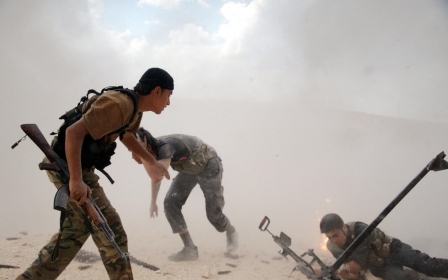Top Iranian commander reportedly killed in Syria

A commander from Iran's Revolutionary Guards has been killed in Syria, media said Saturday, a disclosure that runs counter to Tehran's insistence it is not fighting alongside President Bashar al-Assad's forces.
Reports that Abdollah Eskandari died while "defending" a Shiite shrine emerged earlier this week but neither the elite military unit nor Iran's foreign ministry have passed comment.
However, the Fars news agency reported that a funeral service would be held for the commander Sunday in the city of Shiraz.
Eskandari was formerly a commander of the Guards' ground forces and also headed a state-run charity in southern Iran that helps war veterans and families of fallen soldiers.
Neither the circumstances of his killing nor details about his role in the Syrian civil war -- where Iran has staunchly backed the Assad regime -- have been officially confirmed.
Stay informed with MEE's newsletters
Sign up to get the latest alerts, insights and analysis, starting with Turkey Unpacked
Local media reports, however, allege that he was beheaded by Al-Nusra Front fighters.
Since the Syrian conflict's outbreak in March 2011, Iran has provided Damascus with intelligence, materiel and military advisers.
But Iran insists it has never sent combat troops to Syria, rejecting such claims.
Despite the denials, Iranian media occasionally reports the deaths of Iranian volunteer fighters killed in Syria.
Among them was Guards commander Mohammad Jamali Paqale who was killed in November while "defending" the Shiite holy site of Zeinab shrine in Damascus.
But some observers argue that Tehran will soon find it harder to continue seeking to justify its intervention in Syria domestically.
"Iran’s military involvement risks alienating [domestic] public opinion, especially as casualties continue to mount. Lack of reliable figures notwithstanding, it is believed that nearly 100 Iranians have been killed on the Syrian battlefields," wrote analyst Mahan Abedin.
"Most of these men are veteran members of the Qods Force, the expeditionary branch of the Islamic Revolutionary Guards Corps (IRGC), and thus of high value and hard to replace," he added.
Assad gets a vote of confidence from Iran
Iran is backing Assad to win a third seven-year term in a Tuesday election that rebels and critics are dismissing as a farce.
The poll will only be held in government-controlled areas inside Syria and not in large swathes of territory that are in rebel hands.
"This election will strengthen the legitimacy of the Bashar al-Assad government," Ali Akbar Velayati, the senior foreign policy adviser to Iran's supreme leader, said Friday.
"His people have realised (Assad) has prevented Syria from disintegrating or falling to occupation," Velayati added.
The Syrian conflict began as a peaceful, Arab Spring-inspired movement demanding political change that descended into civil war after Assad unleashed a brutal crackdown.
At least 162,000 people have died as a direct result of the fighting and bombings, according to the Syrian Observatory for Human Rights, which relies on a network of activists and medics on the ground for its reports.
The European Commission says an additional "200,000 Syrians have died from chronic illnesses due to lack of access to treatment and medicines."
It also says 3.5 million are in areas that cannot be reached by aid workers.
"Denying such access is a crime," European Commissioner for International Cooperation, Humanitarian Aid and Crisis Response Kristalina Georgieva said this week.
On Friday, the Syrian Observatory said that nearly 2,000 civilians, more than a quarter of them children, have been killed in a massive Syrian air offensive on rebel-held areas of Aleppo province this year.
Middle East Eye delivers independent and unrivalled coverage and analysis of the Middle East, North Africa and beyond. To learn more about republishing this content and the associated fees, please fill out this form. More about MEE can be found here.





